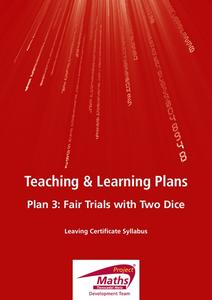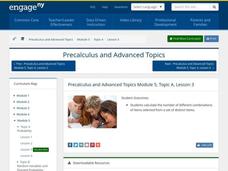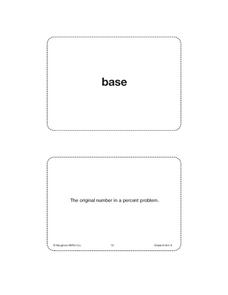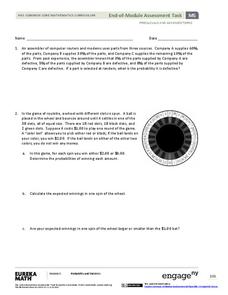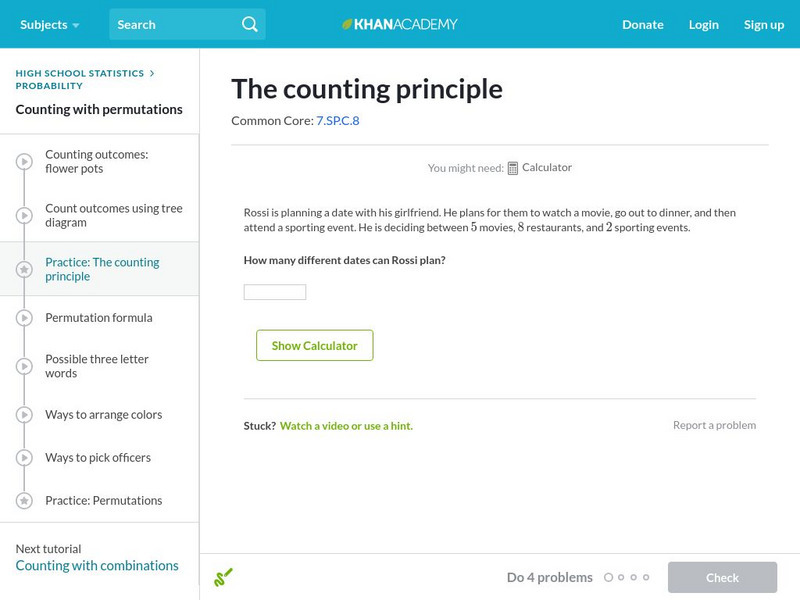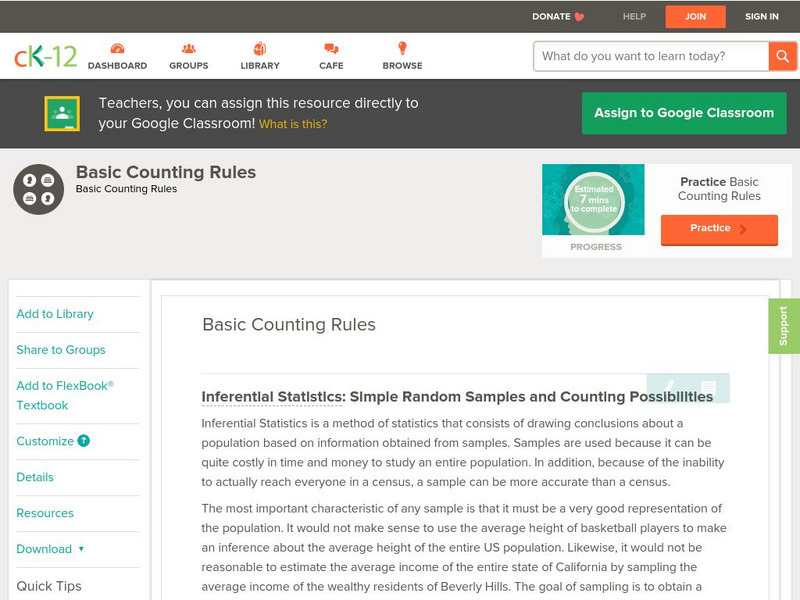Willow Tree
The Fundamental Counting Principle
How many different outfits can you make with what you have in your closet? The Fundamental Counting Principle can help you find an answer! Learners find totals using the Fundamental Counting Principle with problems that can have...
EngageNY
Counting Rules—The Fundamental Counting Principle and Permutations
Count the benefits of using the resource. The second installment of a 21-part module focuses on the fundamental counting principle to determine the number of outcomes in a sample space. It formalizes concepts of permutations and...
CK-12 Foundation
Fundamental Counting Principle with and without Repetition: Outfit Combinations
But I have nothing to wear! Using an interactive, individuals create all possible outfits from three shirts, one belt, and two pairs of pants. Answering a set of challenge questions helps them see what they have learned from the...
Project Maths
Fair Trials with Two Dice
Life's not fair, but dice games should be. After playing a two-person game with a pair of dice, scholars investigate the fairness of the game. They consider the number of possible outcomes using the fundamental counting principle and...
EngageNY
Counting Rules—Combinations
Discover how combinations are different from permutations. In the third installment of a 21-part module, scholars learn how to determine combinations of objects. They learn to distinguish between situations where order is important and...
CK-12 Foundation
Counting Techniques: Permutations and Combinations
Comparing and contrasting is an important skill, even in mathematics. A drag-and-drop interactive has users classify situations as suitable for permutations or combinations. A set of challenge questions tests whether they know the...
CK-12 Foundation
Basic Counting Rules: Sandwich Shop
Young mathematicians make a tree diagram of all possibilities for sandwiches using an interactive. They learn how multiplication speeds up the process of finding the number of outcomes.
Houghton Mifflin Harcourt
Unit 6 Math Vocabulary Cards (Grade 6)
Fifty-eight flashcards make up a set designed to reinforce math vocabulary. Within the set, you'll find bold-faced word cards as well as definition cards that offer a labeled example. Terms include base, percent, theoretical...
Balanced Assessment
MasterMind
Knowledge of statistics and probability can increase your advantage when playing games. The activity asks learners to analyze the game of MasterMind to determine the number of possible codes. They also examine different variations of the...
EngageNY
End-of-Module Assessment Task - Precalculus (Module 5)
Give your young scholars a chance to show what they've learned from the module. The last installment of a 21-part series is an end-of-module assessment task. It covers basic and conditional probabilities, expected value, and...
EngageNY
Mid-Module Assessment Task: Pre-Calculus Module 5
Determine if any reteaching with a mid-module assessment task. The assessment covers the general multiplication rule, permutations and combinations, and probability distributions for discrete random variables.
Rice University
College Algebra
Is there more to college algebra than this? Even though the eBook is designed for a college algebra course, there are several topics that align to Algebra II or Pre-calculus courses. Topics begin with linear equation and inequalities,...
Rice University
Precalculus
Take a step beyond Algebra 2. Learners use the eBook to learn concepts from the typical Precalculus course. Content starts off with a short review of functions in general and moves on to the basic functions, finishing up with more...
CK-12 Foundation
Permutations with Repetition: Permutations and Repetition
What's in a name? An interactive asks users to find the number of ways to arrange the letters in the word DAD and MOM. Pupils use the interactive to arrange the letters but restrict the permutations to be unique for MOM and answer...
CK-12 Foundation
Sample Spaces and Events: Triple Spin!
Scholars determine the number of possible outcomes when a spinner is spun three times. They start with the case of one spin and build up to the case of three spins.
Virginia Department of Education
Organizing Topic: Probability
The probability is high learning will occur! A well-designed unit introduces learners to the concepts of independent, dependent, and mutually exclusive events. Using Venn diagrams, the lessons ask learners to analyze many different...
McGraw Hill
Glencoe: Self Check Quizzes 2 Fundamental Counting Principle
Use Glencoe's Math Course 2 randomly generated self-checking quiz to test your knowledge of the Fundamental Counting Principle. Each question has a "Hint" link to help. Choose the correct answer for each problem. At the bottom of the...
Cuemath
Cuemath: Fundamental Counting Principle
A comprehensive guide for learning all about the fundamental counting principle with definitions, determining sample space, solved examples, and practice questions.
Texas Instruments
Texas Instruments: Probability and Fundamental Counting Principle
In these questions, students use the fundamental counting principle, combinations and permutations to determine the number of possible outcomes and the probability. Solutions and explanations are included.
Houghton Mifflin Harcourt
Holt, Rinehart and Winston: Homework Help Independent Practice: Fundamental Counting Principle
Get independent practice using the Fundamental Counting Principle. Each incorrect response gets a text box explanation and another try. Correct responses are confirmed.
Oswego City School District
Regents Exam Prep Center: Counting Principle
The counting principle is even easier to understand after reading this tutorial. There are practice problems and a teacher resource page included.
Khan Academy
Khan Academy: The Counting Principle
Practice counting possible outcomes in a variety of situations. These problems cover everything from counting the number of ways to get dressed in the morning to counting the number of ways to build a custom pizza. Students receive...
CK-12 Foundation
Ck 12: Probability: Basic Counting Rules
[Free Registration/Login may be required to access all resource tools.] This Concept introduces students to the most basic counting rule: the multiplication rule. It also explains the probability of simple random samples.
Khan Academy
Khan Academy: Robot Combinations (Practice)
This is a 7-problem quiz/practice counting robot combinations with two parts.



